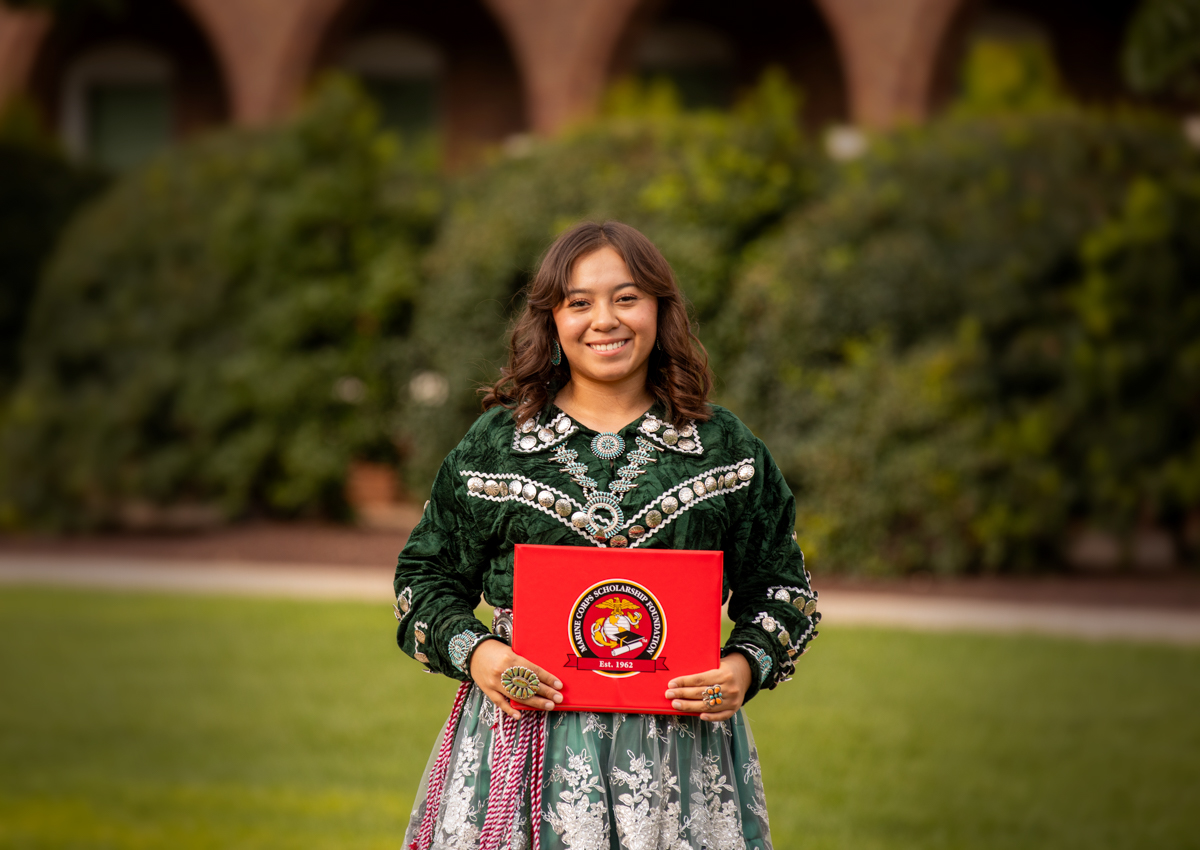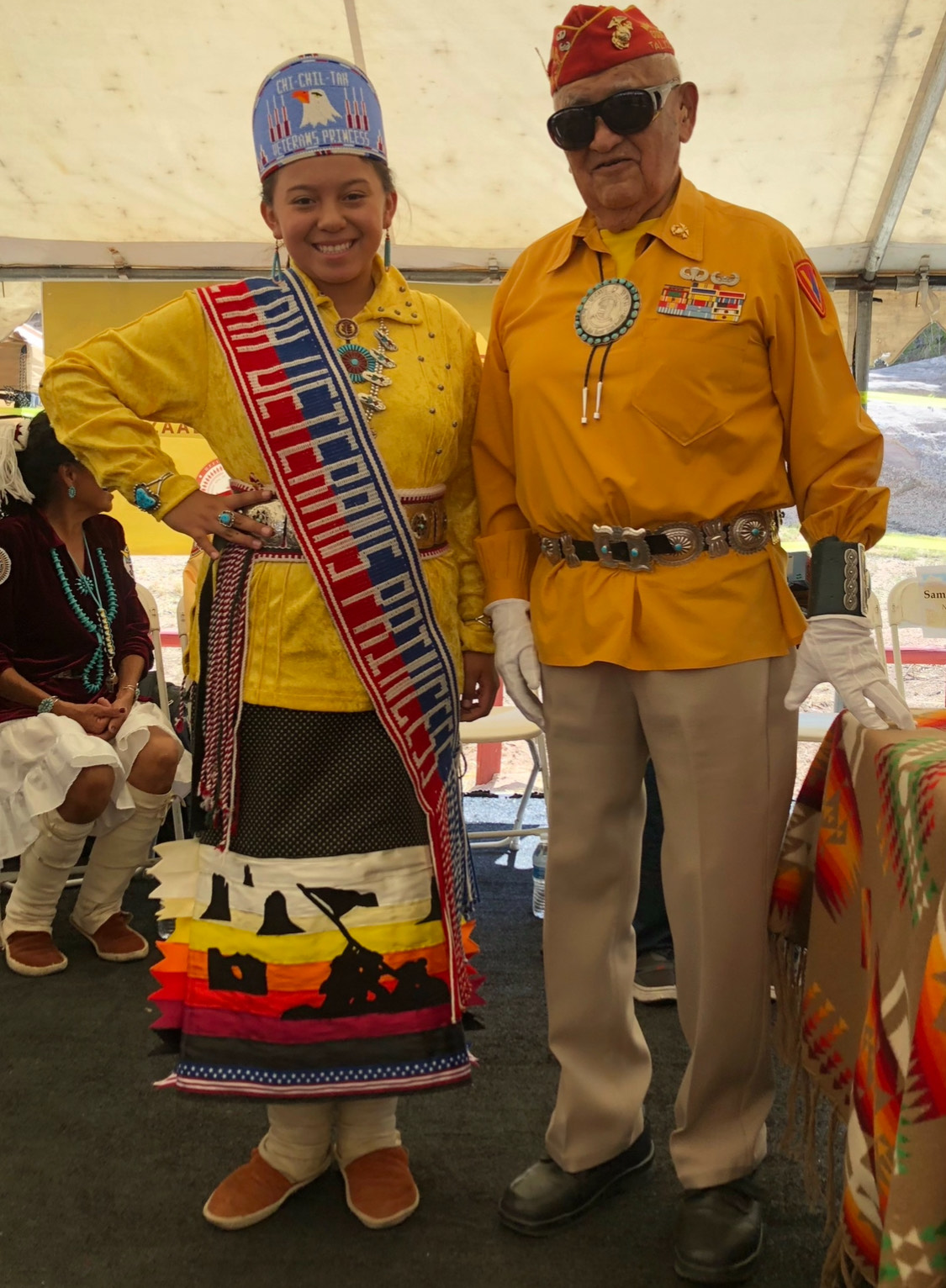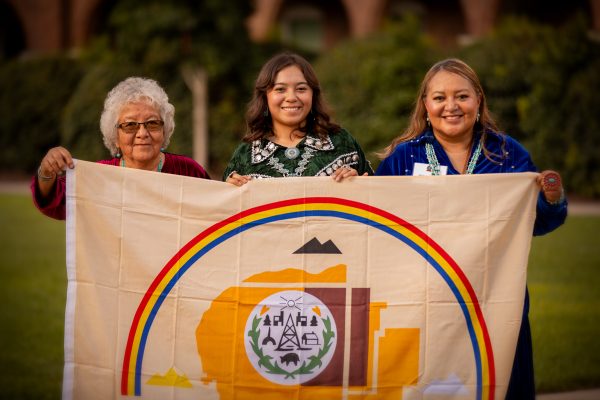Honoring a Legacy of Service and Sacrifice: National Navajo Code Talker’s Day
Every year on August 14th, we honor the remarkable legacy of the Navajo Code Talkers, whose historic contributions were pivotal in our Nation’s victory during World War II. The original 29 Navajo Code Talkers created an unbreakable code based in their language. Their communications on the battlefield in the Pacific proved to be invaluable, saving countless American lives.
Chester Nez was the last surviving member of the original 29 Navajo Code Talkers. His legacy lives on not only in our country’s history but also in the hearts of his family, the Navajo community, and here at the Marine Corps Scholarship Foundation.
Talise Francisco, Nez’s great granddaughter, is a first-year scholarship recipient and member of the Dibéłizhiní – the Black Sheep clan – Navajo community of Chichiltah in New Mexico. Her mother, veteran Hospitalman Third Class Valeria A. Robinson USN, Nez’s granddaughter, continued their family’s legacy of service.
We spoke with Talise and Valeria about their family’s long history of service and sacrifice.
What do you remember about Chester Nez, and how do you honor his legacy?
Valeria: “As a Navajo, we are raised to know who our family are through K’é, a Diné (Navajo) Kinship. K’é is a very important social identity as a Navajo as it defines our family and descendants. My clans are Dibéłizhiní (Black sheep Clan), born for Kinłichíi’nii (Red House Clan), my maternal grandparents are the Honágháahnii (One who walks around clan), and my paternal grandparents are the Tábaahá (Water’s Edge clan).
“Our grandfather, Chester Nez, was one of the original 29 Navajo Code Talkers…I remember my elderly people speak very highly of him and how he served in the war. One thing that I always remember was his encouragement to do something good for ourselves and most importantly, to learn our Navajo language.”

What does it mean to you and your family to have been awarded a scholarship from the Marine Corps Scholarship Foundation?
Talise: “It means so much to me, and it is a great honor to be awarded a scholarship from the Marine Corps Scholarship Foundation… I gave [the application] a lot of thought and the main thing that came to mind were how much the Navajo Code Talkers and the veterans mean to me. This scholarship will help pay for my college and to be successful. During the awards ceremony in Washington, DC, it was mentioned that the veterans and military personnel enlist in the military to serve our country so their children have opportunities like applying for this scholarship… I am so grateful for my mom to have served our country so my brothers and I have these opportunities.”
What do you hope others can learn from the Navajo community, Navajo Code Talkers, and Indigenous culture?
Talise: “I hope others can learn about the historical challenges we have faced and are still facing, but most importantly, to learn about the sacrifice and bravery that the Navajo Code Talkers did during World War II and why our Navajo language is sacred. I would also like others to learn more about the tribes within the Indigenous culture, our languages, our community and kinship, the cultural preservations, and the traditions we have as Native Americans.”
Valeria: “My hopes for the next generation are to give as much effort to learn and understand the Navajo language. Our Navajo language is very sacred, and I would like for the next generation to keep our language and culture alive. Our Navajo culture is incredibly unique. We still live on the reservation and depend on border towns to get supplies and essentials. Some of us still live without electricity and running water. Although we have these struggles, living this lifestyle is normal for us. We still practice our Navajo traditions and encourage our youth to learn our Navajo language.”

Is there anything else you’d like to share about Chester Nez and the Navajo Code Talkers?
Talise: “I was crowned as the Chichiltah Veterans Princess for four years. My platform was to encourage our youth to learn about the Navajo Code Talkers and to learn our Navajo language. As a princess for the veterans in my community, I traveled to many places where I sang songs and the National Anthem in the Navajo language and made speeches about our sacred Navajo language. I participated in the Navajo Code Talker Day events and Veterans Day events where I was fortunate to meet other Navajo Code Talkers on our reservation.
“I encourage everyone to honor our Navajo Code Talkers not only on this day but every day. If it wasn’t for our Navajo language and our Navajo Code Talkers, the outcome of World War II would have been different. I am so honored to be a descendent of my great grandfather, and I honor his legacy by learning the Navajo every day, stressing the importance of our Navajo language and most importantly, put K’é (kinship) above everything I do and say.”
Valeria: “In my community of Chichiltah, we have five Navajo Code Talkers – Chester Nez, Kee Etsitty, Richard Dooley, Robert Walley, and Thomas H. Begay. Everyone in our community is always so proud to acknowledge them. My uncle, Thomas H. Begay, is one of the last two Navajo Code Talkers left. Today, I am so honored to say that my grandpa was one of the original Navajo Code Talkers… I have so much respect for our Navajo Code Talkers and encourage our youth to learn our Navajo language because it is very sacred.
“Our Navajo Code Talkers are our heroes, and we, as the Navajo people, hold them dearly in our hearts.”


